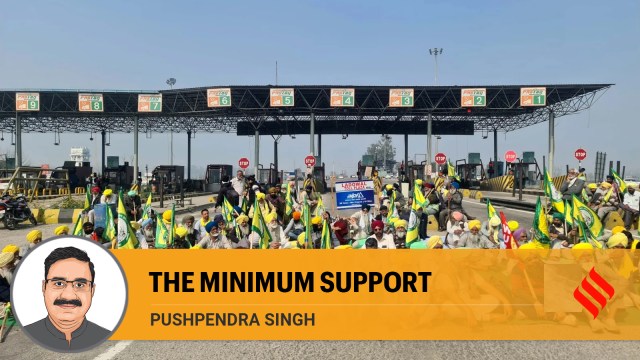
In the last two years, nothing concrete was done by the central government on the agreement it had reached with agitating farmers’ unions, who had protested near the national capital. The government should have had the wisdom to act and take a decision on a legal guarantee for Minimum Support Price (MSP) and other demands with alacrity, lest they become the basis for a renewed agitation. This lack of action is the reason and justification for farmer unions launching the current agitation. The purpose is to press the government to fulfil its promises. This time too, the debate is around the feasibility of their primary demand — the legal guarantee for MSP.
Let’s frame what the demand actually is. It has two parts. First, MSP should be based on the comprehensive cost of production (C2), as determined by the Commission for Agricultural Costs and Prices (CACP), plus 50 per cent, as recommended by the Swaminathan Commission. This was also promised by the BJP and articulated several times by Prime Minister Narendra Modi. The second part of the demand is that the 23 crops for which MSP is thus announced should be legally purchased at or above the MSP price by anyone who “willingly enters” the market.
Government purchase, including sugarcane purchase at government-prescribed prices, is at about Rs 4-5 lakh crore. Only Rs 5-6 lakh crore worth of MSP crops is bought by the private sector. If we take the long-term aggregate for all 23 MSP crops, what is paid by the private sector is on average 25 per cent below the MSP value. If there was legal status for MSP, then the private sector would have paid a maximum of Rs 1.5 lakh crore more to the farmers for the same quantities in 2023-24. So, even if the whole of this bill is picked up by the government, it won’t be more than Rs 1.5 lakh crore annually — not the exorbitant figures being quoted by the so-called economists. We should remember that the reduction of corporate tax rates in 2019 alone led to the foregoing of about Rs 1.5 lakh crore annually by the central government, a figure that keeps rising every year.
If this money flows to the farmers, they will spend it and thus create more demand in the market. Due to the multiplier effect, this will lead to an increase in employment, investment and eventually government taxes. All 23 crops being legally sold at MSP will also lead to crop diversification, which is the focus of the recent offer from the government. Since there would be no incentive to grow only those crops where MSP is now available — mostly paddy, wheat and sugarcane — it will lead to various economic and ecological benefits. Legal MSP would be a great instrument to control the production quantities of various crops to match demand.
The country would also become self-sufficient in edible oils and pulses if we ensure remunerative MSP for these crops. If the government and private prices for the crops are the same, farmers won’t seek out the government to purchase their crops. So, the Centre will not be financially burdened by having to purchase more quantities than it requires. This will lead to a reduction in government purchase, storage and redistribution costs for these crops. That is a huge financial saving. It will help lower the fiscal deficit and improve government finances. Hence, a legal guarantee for MSP is a win-win for all stakeholders.
Some economists argue that if the MSP is legally enforced, the private sector won’t purchase the crops and all the produce will have to be bought by the government.
Farmers are seeking an enforcement of the price only for those entities that “willingly enter” the market. In the case of sugarcane, for example, the price is prescribed by the government but that hasn’t meant that private mills have stopped purchasing sugarcane. Have industries closed due to the Minimum Wages Act? Is nobody purchasing petrol and diesel because the government is charging exorbitant taxes?
By definition, MSP is a minimum price that the farmer must get to remain in business. Without such a price, farmers will become bankrupt and leave farming, which will have serious consequences for our food security, adversely affecting consumers. Legal MSP is a viable proposal and the rights of our farmers can’t be denied any longer.
The writer is president, Kisan Shakti Sangh and an alumnus of the Institute of Rural Management, Anand (IRMA)